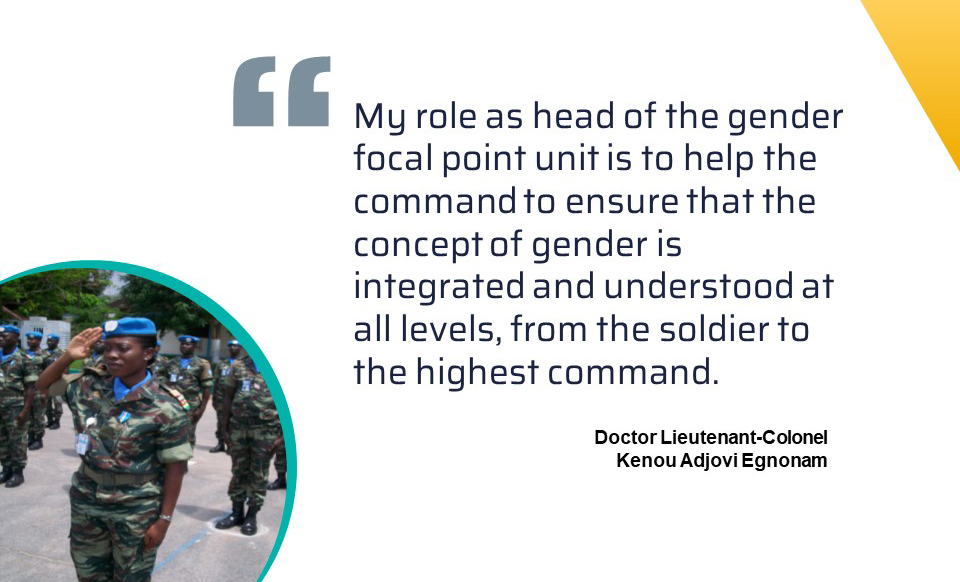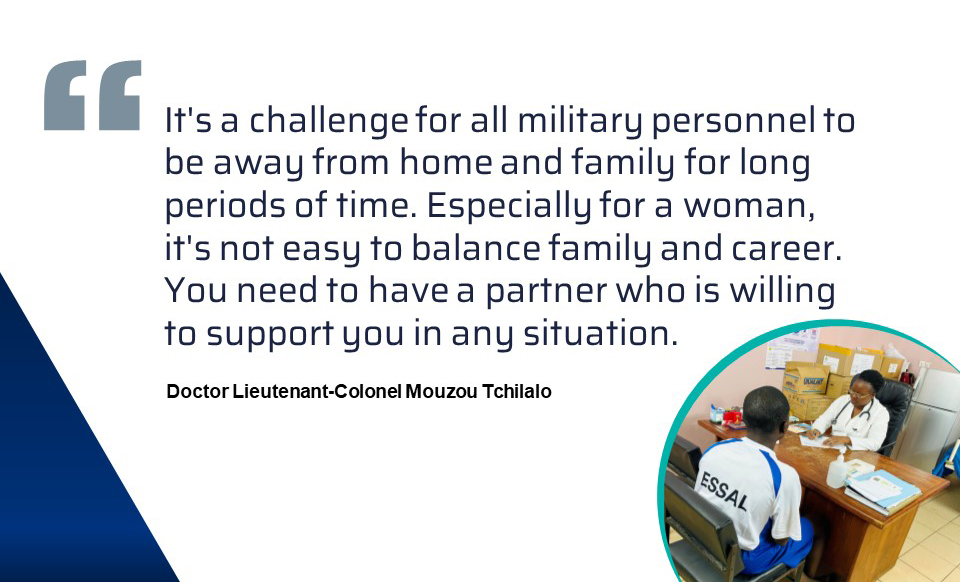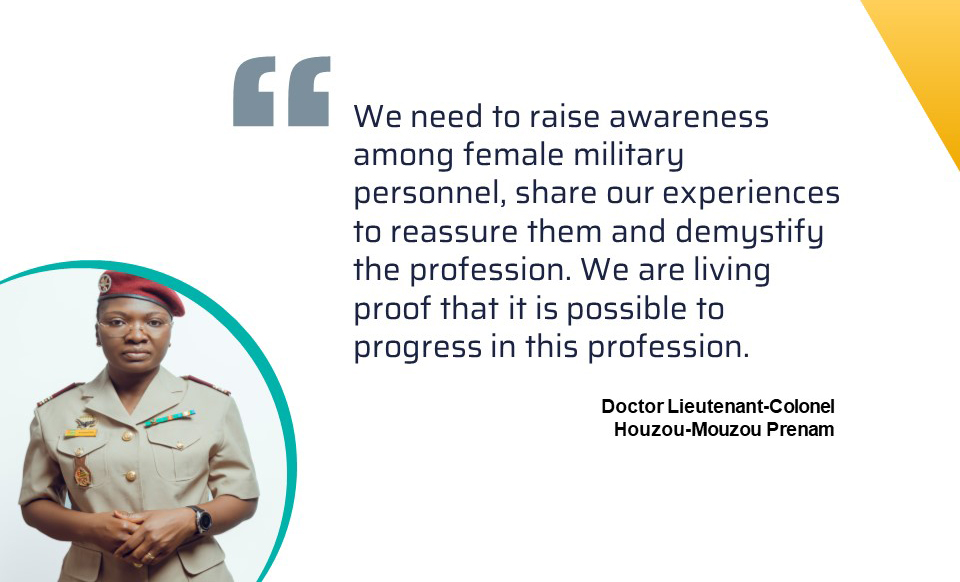Women who have shaped SSGR – being the first women in the Togolese army
For this latest in our series, we interviewed three women from Togo who were among the first women to join the country’s army when it opened up to medical personnel in 1996. They shared their experiences of serving in the army for more than twenty years and their views on the evolution of the role of women in the institution.
CHALLENGES THAT COME WITH CHANGES
Kenou Adjovi Egnonam is a gynecologist and obstetrician and head of the Armed Forces Family Medical Centre. She also leads the Gender Focal Point Unit of the Ministry of the Armed Forces.

When she began her career, the concept of gender did not exist in the army, and the specific needs of women soldiers were not mentioned in the texts governing the structure and organization of the army. She was the first Togolese woman to be sent on a United Nations peacekeeping mission, where she was the only woman in a contingent of 500.
The lack of popularization and knowledge on gender among the armed forces' personnel meant that the existing biases against women and what they could achieve as soldiers were not addressed. “The main problem was to show our male colleagues that we were capable, professional, responsible, and committed. We had - and still have to - cultivate excellence to be accepted and gain the trust of the hierarchy,” says Doctor Lieutenant-Colonel Mouzou Tchilalo, Deputy Director of the army’s school of health services in Lomé, Togo’s capital, who has also served in elite units such as the parachutist and the presidential guard commando regiments..
According to the women, cultural barriers are also very strong in Togo and in Africa in general; the expectation is that women will stay home and take care of the family. “Most of the time parents refuse to let their daughters join the army because of preconceived ideas. Awareness-raising can change this mentality, breaking down the barriers that prevent women from joining the army and helping them to believe that they can do so and bring values to the field," says Doctor Lieutenant-Colonel Kenou.
Family support is also essential for female soldiers to help them cope with family duties and responsibilities when they are in the field. They all agree that it is key to find a husband who is understanding and supportive to make a successful career in the military. When they started out, it was still rare for women to join the army because it was difficult to get the support of the head of the family and close relatives.

COMMITMENT TO IMPROVEMENT AND PROGRESS
In 2023, both the Prime Minister and the President of Togo’s National Assembly are women and from 2020 to 2022, a women has been appointed head of the Ministry of the Armed Forces for the first time. It didn’t happen by accident. During the time they have been in the military, Togo has made consequent efforts to promote greater gender equality and include women in high-level positions in government.
In 2008, a pilot project introduced new special units in some government ministries that were dedicated to working on gender mainstreaming in policies and programmes. In 2011, the country adopted a national policy on gender equality. By 2016, all ministries had a special gender unit, including the Ministry of the Armed Forces.
This commitment of the government and the army has been reflected in the participation of Togo in the Elsie Initiative. Since 2021, the Togolese armed forces have been implementing the MOWIP methodology to reduce barriers for women in UN peace operations, followed by the Police and Gendarmerie in 2022.
This strong political will has resulted in greater support from the army’s leadership to give women more opportunities to progress and a more inclusive working environment. Houzou-Mouzou Prenam is a rheumatologist in the Togolese Armed Forces. She’s also Vice-Dean of the Faculty of Health Sciences at the University of Kara and head of the rheumatology department at the university hospital in Kara, the second largest city in Togo.
In 2019, she was present during the visit of the Chief of Staff, who came to talk to the managers responsible for training the new recruits. "What made a positive impression on me was that, for the first time, it was clearly stated that there would be no tolerance for a manager who abused a recruit," says Doctor Lieutenant-Colonel Houzou.
According to the Doctor Lieutenant-Colonel Kenou, the curriculum of the Togolese army’s school has improved greatly over the years thanks to this greater focus on gender equality. The training is more in-depth and varied and she is in the process of introducing specific gender modules that will be disseminated to all military schools in the country.
"When these students complete their studies, a big step will have been taken. They will understand the concept of gender, its importance, and how to apply it to their activities. They will see that women have their own assets to contribute to the success of a mission," says Doctor Lieutenant-Colonel Kenou.

A great deal of time has also been devoted to raising awareness among new recruits, especially women and their families. Public events with open debates and meetings in schools and sports clubs were organized in several of the country's major cities. For example, a volleyball tournament was organized between army women and a local women’s sport club. This helps to break down stereotypes and give young women the chance to ask questions about what the army can do for them.
In addition to all what they have done throughout the years in policy and practice, perhaps their greatest contribution to shaping SSG/R is the inspiration they provide for young women who aspire to a career in the military.
“When girls see us, they think it's possible for them to do it too. We have to be good role models for the next generation,” says Doctor Lieutenant-Colonel Kenou.

Their advice to find your place in the army :
• Love your job. This is a calling.
• You must have a culture of service excellence. This job is demanding and you will need to prove yourself through hard work, discipline and always giving your best.
• Believe in yourself. Your limits are the ones you set for yourself. Have confidence, don't undermine yourself or let someone else do it for you.
• Be available. You must be ready to serve at all times, without personal or professional limitations.
READ MORE IN OUR WOMEN WHO HAVE SHAPED SSG/R SERIES:
• Sorcha MacLeod, an academic expert on private security and human rights
Cover photo: Ministry of the Armed Forces
 Share on Facebook
Share on Facebook Share on Linkedin
Share on Linkedin Share on Twitter
Share on Twitter